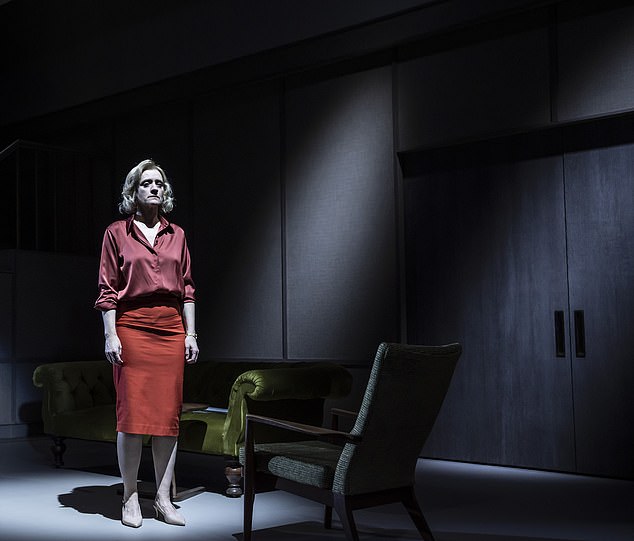Anne-Marie steals the show as a fearsome lady in red and Piers Morgan's son bounces back from a real-life drama: ROBERT GORE-LANGTON reviews The Little Foxes
The Little Foxes (Young Vic)
Until February 8 (2hrs 15 mins)
Cat On A Hot Tin Roof (Almeida Theatre, London)
Until February 1 (3 hours)
Ten minutes into The Little Foxes there was an unscripted drama.
A young actor keeled over in a dead faint. The star, Anne-Marie Duff, looked on concerned, helpless. Is there a doctor in the house? There was, thankfully. We all shuffled off to the bar, wondering if a cancellation was on the cards.
Forty minutes later we were back in our seats. The tyro actor – Stanley Morgan (Piers’s son) – was back on stage. The kid obeyed the first rule of showbiz. You go on. Even if your leg has fallen off.
He got a big, much-deserved round of applause at the end.

The LIttle Foxes comes across as epic and often magnificent. But three hours is quite enough

Piers Morgan's son Stanley keeled over in a dead faint, but still carried on after an interruption to proceedings
It was a prequel to a family melodrama that catches fire but never really blazes. The author of this 1939 play (also a famous film with Bette Davis) is the American writer Lillian Hellman – an unrepentant Stalinist with a famous disregard for facts (Mary McCarthy once said of Hellmann that ‘every word she writes is a lie, including “and” and “the”’).
But as a dramatist she had a terrific gift for writing nasty roles for women, including Regina, who will stop at nothing to settle her stake in the plantation in the Deep South.
Set in the 1900s, the play has been updated to the 1960s to its advantage.
Duff, so vulnerable in TV’s Bad Sisters, is a human raptor here as Regina: dressed in red but exuding naked self-interest. She is determined on securing an inheritance threatened by her brothers, played with varying shades of loathsomeness by Mark Bonnar and Steffan Rhodri.
In one cruel moment, Regina’s invalid husband (John Light) expires due to her icy inaction – a hammy scene that you would need a heart of stone not to laugh at.
But all the nastiness in the end feels self-defeating. It’s a one-note anti-capitalist play about a family of jackals. And Duff is the best of a classy pack.
Another cotton-pickin’ drama is going on at the Almeida Theatre in Tennessee Williams’s classic Cat On A Hot Tin Roof, which follows the recent A Streetcar Named Desire at this address. Paul Mescal starred in Streetcar. Here it’s his Normal People co-star Daisy Edgar-Jones who plays Maggie the Cat.
Forget the tin roof: she prowls gorgeously on top of a piano. Wow! Edgar-Jones gives Maggie her best Kentucky fried drawl. She has to hold the stage for a mighty long monologue but she manages it – exuding a raunchy sexual hunger. That’s because her handsome gay hubbie Brick won’t sleep with her.
Kingsley Ben-Adir as Brick hobbles about with one crutch and a bent smile, drinking to forget his dead friend Skipper – his true love. His role is one repeated hobble to the decanter. You can smell the bourbon.

But all the nastiness in the end feels self-defeating. It’s a one-note anti-capitalist play about a family of jackals
This Southern cotton clan have gathered on the occasion of Big Daddy’s birthday. Big D and Big Mama (the wonderful Clare Burt is, frankly, neither fat nor vulgar enough) doesn’t know he’s dying of cancer though, oddly, the rest of the family does.
Lennie James as bullying Big Daddy doles out abuse while bemoaning the ‘obnoxious odour of mendacity’ in the household. James is growly and powerful, though he lends a fatal hint of warmth to this monster.
There are fine performances from Ukweli Roach and Pearl Chanda as Brick’s older brother Gooper and his ghastly wife Mae, parents of the ‘no-neck monsters’, Maggie’s term for the shrieking kiddies she wants to throttle.
Steamy themes, shady people, decked out in glorious language of wit and sorrow. Director Rebecca Frecknall needlessly trowels on some unconvincing stage effects – this is after all a posh soap opera: think Dallas written by a bitter genius.
It comes across as epic and often magnificent. But three hours is quite enough.
Mike Leigh's arr-esistible Pirates
by David Mellor
The Pirates of Penzance (London Coliseum) January 24 - February 21
Towards the end of the 20th century, amid events such as the demise of the D’Oyly Carte Opera Company, many thought it was all over for Gilbert & Sullivan. Mystic Mellor never did.
There’s something about the exceptional quality of Sullivan’s melodies and Gilbert’s lyrics, especially when cleverly updated (as in Jonathan Miller’s unforgettable Mikado).
And, to strengthen my conviction that G&S is here to stay, comes this revival of Mike Leigh’s 2015 staging of The Pirates Of Penzance. Leigh is a radical of great charm but strong conviction.
And the fact he loves G&S and has even been prepared to do what he said he never would and stage one, shows that it is still for him a compelling experience.
Miller made The Mikado irresistible by making lots of changes. Leigh, under new revival director Sarah Tipple, makes Pirates pretty irresistible because he can entertain without changing things, showing that Gilbert’s wit, when properly staged, still works.

The Pirates of Penzance performed at the London Coliseum in 2015
Finally, while there are still older artists of Mike Leigh’s quality entranced by G&S, they have been joined by a younger generation. Like John Savournin, the Pirate King, who not only inspires himself but others to put on lively and authentic shows.
There’s also a notable discovery in William Morgan as Frederic, the pirate apprentice. Happily, Richard Suart, the great grand-daddy of patter merchants, remains as the Major-General. And the American bass James Creswell, an ENO stalwart for years, is an exceptional Sergeant of Police.
Of course not everything can be this good. I found the conducting of Natalie Murray Beale stolid, and could do without her the next time.
But this is not a moment for quibbling, it is a moment to rejoice. With fun from beginning to end, and lots of performances, do give it a try.

























































































































































































































































